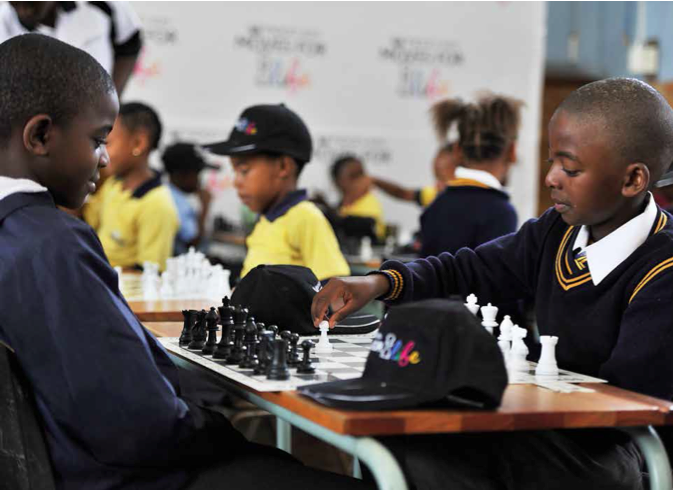Govt and Tsogo Sun make a move to boost chess for learning
Govt and Tsogo Sun make a move to boost chess for learning sadminSport, arts and culture
Sport and Recreation South Africa (SRSA) and the Department of Basic Education (DBE) have teamed up with hotel group Tsogo Sun to use the game of chess as a learning tool in disadvantaged schools in the country.
 This initiative will see teachers being trained, thousands of learners being taught and chess sets being distributed at schools to improve learners'
This initiative will see teachers being trained, thousands of learners being taught and chess sets being distributed at schools to improve learners'
marks. Chess is ranked 16th among government’s top priority sporting codes for schools, and is a great learning tool to boost learners’ skill sets and development. According to SRSA, chess improves concentration, develops logical thinking, analytical skills, visualisation skills, decision-making skills, abstract thinking, planning skills, and memory, among others.
SunCares, which is Tsogo Sun’s corporate social investment initiative, has invested around R10 million in a national school chess programme, Moves for Life, over three years. Moves for Life is a local initiative which uses chess to improve education in maths, science and literacy. It targets children from as young as five years old and has already been implemented at more than 70 schools nationwide. Through the campaign over 50 000 school learners will effectively be taught maths, science and life skills through chess.
Marisa van der Merwe of Moves for Life says the integrated project uses education, sports and culture to help learners develop a different attitude towards their school work.
“There is a dire need to increase the maths, science and literacy capabilities of children all over the country,” says Vusi Dlamini of Tsogo Sun. “Statistics show that for every 100 children that entered grade 1 in 1999, less than 40 wrote matric in 2011, and only one may have matriculated with maths in higher grade. The fact is that to sustain South Africa’s global competitiveness, at least 25 out of 100 learners need to have matriculated with maths and science.” In light of this, Tsogo Sun heeded government’s call and has come on board to work together to do more. The programme is divided into three key elements, MiniChess which targets Grade R to Grade 3 learners, MasterMoves which is for learners aged nine and older, and teacher training.
The first phase saw 400 teachers being trained to carry the campaign out in their schools and by the end of the year about 15 000 children will be on their way to grasping the wonders of chess.
To see if the programme meets its desired effect of improving learners’ development, the University of Johannesburg has also made its move to conduct impact studies on the learners, teachers, schools and communities. Baseline studies are underway and long-term impact studies will be carried out at regular intervals for the next three years to monitor and evaluate the value of chess in education. “We truly believe that Moves for Life will see children improving their comprehension of maths, science and literacy and that it will have a beneficial impact on their development in their school years, laying a strong foundation that can be built on throughout their lives,” says Dlamini. “We are privileged indeed to be in a position to make this potentially significant contribution into children’s lives.”